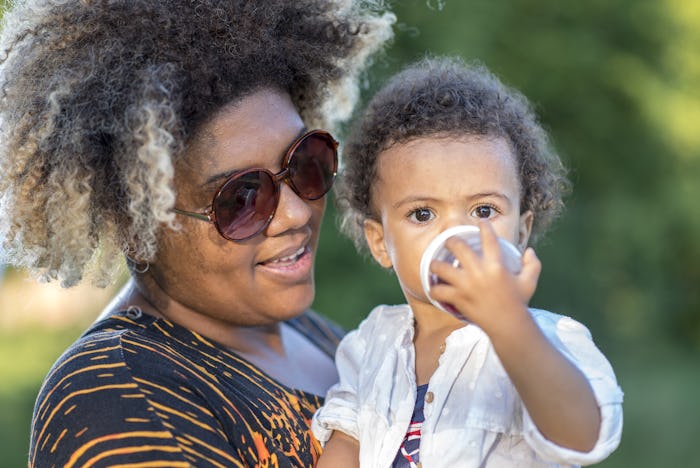Life

7 Surprising Stats That Show Millennial Moms Are Actually More Traditional Than Their Parents
When you think of millennials, you probably put them into one of two categories: coddled, self-obsessed snowflakes or educated, tech-savvy progressives. Neither description really captures the generation fairly, but that's what millennials are generally reduced to. Regardless, I'm guessing the word "traditional" doesn't come to mind. But that's where you're wrong, especially when it comes to parenting. You may be surprised at the statistics that show millennial moms are actually more traditional than their parents.
As a liberal, forward-thinking person typical of my generation, I'm often surprised at just how "traditional" my life appears, at least from the outside looking in. When I had my daughter, I quit my teaching job of 13 years to become a stay-at-home mom. Even though I now work two side hustles, I'm still my kid's primary caregiver. I also bear the brunt of both household maintenance and meal preparation. As old-fashioned as it is, my husband provides for us financially. I think what sets my situation apart, however, is that it's my choice. I've opted for a so-called traditional lifestyle because it's what I wanted, not because it was my only choice or because the choice was made for me by someone else.
According to the Pew Research Center, millennial women account for the vast majority of births in this country. Millennial moms are shaping parenting in the United States, and they're doing it in a way that's unexpected — by returning to (at least some of) the ways of the past:
More Millennial Moms Are Staying At Home
According to the Pew Research Center, the number of stay-at-home moms is on the rise, with 29 percent of moms not working outside the home in 2012. It's important to note that this statistic does account for moms who are unable to find work or are in school, but a full two-thirds are traditional stay-at-home moms with working husbands.
It's not just the numbers, though. It's the attitude of millennial moms around staying at home that's changing. While their own mothers broke barriers by entering the work force en masse, millennial moms see the decision to stay at home as a very personal one to which they're entitled.
Amongst younger millennials, the ideal family arrangement appears to be the "traditional" one. In a 2014 survey, 58 percent of high school seniors indicated a preference for the working father/homemaker mother arrangement, up from 42 percent two decades prior.
Millennial Moms Prioritize Family Time
Eating dinner at the table as a family was once the measure of the importance of togetherness. What was commonplace for Baby Boomers was a rarity for Generation X, with their house keys around their necks and TV dinners on their trays.
Millennial families may not come together at mealtimes, but they absolutely prioritize connection. When both parents work, millennial moms and dads will focus on family time on the weekends. It's a different approach, but children of millennials are getting more time with their parents than millennials themselves did.
Millennial Moms Maintain A More Traditional Division Of Labor In The Home
It's surprising that a generation of women raised mostly by career-minded mothers would accept such inequity when it comes to sharing childcare and household chores with their partners, but that's exactly the case.
According to Pop Sugar, millennial moms spend half the amount of time engaged in paid work as dads. At the same time, they spend twice as much time caring for children and maintaining the home as their husbands.
Millennial Moms Are Parenting The Way They Were Parented
In previous generations, mothers relied on their own parents as models for raising children. What perhaps sets Generation X apart is the way they broke from their Boomer parents. The first "day care" generation, they decided to put their kids first.
Now that they're parents, millennials aren't necessarily breaking from the way they were raised (although they are moving away from helicopter parenting). According to Millennial Marketing, half of all millennials say they're parenting the way they were parented.
Millennials Value Parenting & Marriage Over Career
Unlike their workaholic parents, millennials are more likely to prioritize family. According to Forbes, millennials put parenting and marriage significantly above career and finances.
They're a little more extreme than prior generations, though, being more likely to say that parenthood is very important to their identity and that parenting is is rewarding... all the time.
Fewer Millennial Marriages End In Divorce
According to Forbes, only 6 in 10 millennials were raised by both parents. The trend among millennials is to live together before getting married, and according to Insider, it's helping protect them against divorce.
Of course, many millennials are eschewing marriage altogether. Heterosexual couples especially are wary of walking down the aisle. This trend may be reversing, though. Research firm Demographic Intelligence estimates that a full 60 percent of babies of millennials will be born to married parents.
Millennials Embrace "Resilience Parenting"
In reaction to their parents' hands-off approach, Generation X moms and dads became arguably overly engaged in parenting. The '80s saw a shift where children's happiness and safety became the priority. Having been raised on participation trophies, many millennials are taking a more relaxed approach.
According to Shaping Tomorrow, millennial parents are turning to resilience parenting. In this parenting method, parents allow children the space and freedom to solve their own problems.
It made sense for parents who needed their children to take on childcare and farm work early on, and it makes sense for a parents now who, as a generation, want to prepare their kids for the kind of uncertainty they have faced.
Check out Romper's new video series, Bearing The Motherload, where disagreeing parents from different sides of an issue sit down with a mediator and talk about how to support (and not judge) each other’s parenting perspectives. New episodes air Mondays on Facebook.